 W
WThe Government of Pakistan abbreviated as GoP, is a federal government established by the Constitution of Pakistan as a constituted governing authority of the four provinces, two autonomous territories, and one federal territory of a parliamentary democratic republic, constitutionally called the Islamic Republic of Pakistan.
 W
WRizwan Ahmed is a Pakistani civil servant who serves in BPS-22 grade as the Maritime Secretary of Pakistan, in office since April 2019. He did his two-year Master in Public Administration from Harvard University and joined the Pakistan Administrative Service in 1988. He was promoted to the country's highest civil service rank of Federal Secretary in 2017.
 W
WSyed Abu Ahmad Akif is a retired Pakistani civil servant who served in BPS-22 grade as the Cabinet Secretary and Climate Change Secretary of Pakistan. Akif belongs to the Pakistan Administrative Service and was promoted to the rank of Federal Secretary by Prime Minister Nawaz Sharif in 2016. A topper of the 1982 CSS examinations, Akif is known for his performance as Director General of Pakistan's Hajj mission in Saudi Arabia from 2010–2015.
 W
WMuhammad Shehzad Arbab is a retired Pakistani civil servant who serves as Advisor to Prime Minister Imran Khan on Establishment, in office from August 2018. Before his retirement from civil services, Arbab served in BPS-22 grade as the Commerce Secretary of Pakistan and Chief Secretary Khyber Pakhtunkhwa. He belongs to the Pakistan Administrative Service and is batchmates with Tariq Bajwa, Babar Yaqoob Fateh Muhammad and Sajjad Saleem Hotiana.
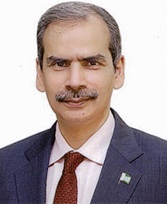 W
WNaveed Kamran Baloch is a retired Pakistani civil servant who served in BPS-22 grade as the Cabinet Secretary and Finance Secretary of Pakistan. Baloch belonged to the Pakistan Administrative Service and was promoted to the rank of Federal Secretary in October 2017. After retirement from active civil service, Baloch was appointed as the Executive Director to World Bank.
 W
WThe Constituent Assembly of Pakistan, was formed to write Pakistan's constitution and serve as its first (interim) parliament.
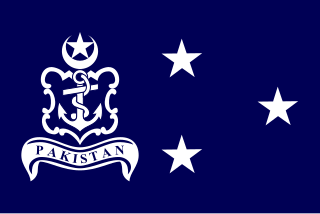 W
WThe Deputy Chief of the Naval Staff (DCNS) are several very important administrative senior military appointments and staff commands, headed and commanded by the Principal Staff Officers (PSOs) at the NHQ. They are also the commander of their respective branch in the Pakistan Navy and these commands are held by senior flag officers of rear admiral and vice admiral rank in the Navy and are directly reporting and functioning under the Chief of the Naval Staff. DCNS appointments play a very important administrative role for the proper functioning of an entire navy. The DCNS appointments ranges from rear admiral to vice admiral rank depending on assignment nature.
 W
WEconomic Advisory Council is a non-constitutional and independent body formed to give economic advice to the Government of Pakistan, specifically the Prime Minister.
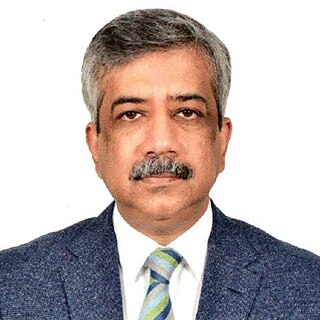 W
WMuhammad Sualeh Ahmad Faruqi is a Pakistani civil servant who serves in BPS-22 grade as the Commerce Secretary of Pakistan, in office since July 2020. Faruqi belongs to the Pakistan Administrative Service and was promoted to the rank of Federal Secretary in June 2020. He hails from Sindh and holds a master's degree from the London School of Economics.
 W
WThe Federal Secretary is the highest-ranking position in the Government of Pakistan, occupied by the most senior civil servant in a specific Ministry or Division. The Secretary is the administrative head of that Ministry or Division and oversees and enforces public policy matters. The authority for the creation of this post solely rests with the Cabinet of Pakistan. The position holder is a BPS-22 grade officer, usually belonging to the Pakistan Administrative Service.
 W
WGrade 22 is the highest attainable rank and pay scale for a civil servant in Pakistan. Grade 22 is equal to a 3-star rank of the Pakistan Armed Forces. With over five thousand civil servants and bureaucrats in Pakistan, only a few dozen officers serve in BPS-22 grade at a given time. Hence, not even 2% of the country's civil servants make it to the highest basic pay scale of grade 22. Officers serving in BPS-22 grade are largely considered to be one of the most influential individuals in the country.
 W
WKamran Lashari is a retired Pakistani civil servant of the Pakistan Administrative Service who served in BPS-22 grade as the Petroleum Secretary of Pakistan and Chief Secretary Sindh. Lashari is best known for his five-year stint as chairman of the Capital Development Authority during the government of President Pervez Musharraf. After retirement from active civil service, Lashari remained president of the Lahore Gymkhana and director general of the Walled City of Lahore Authority.
 W
WJawad Rafique Malik is a Pakistani civil servant who serves in BPS-22 grade as Industries Secretary of Pakistan. Hailing from Lahore, Malik belongs to the Pakistan Administrative Service and is batchmates with Fawad Hasan Fawad, Rizwan Ahmed, Sikandar Sultan Raja and Shoaib Mir Memon.
 W
WShoaib Mir Memon is a retired Pakistani civil servant who served in BPS-22 grade as the Education Secretary of Pakistan and Chief Secretary Balochistan. Memon belongs to the Pakistan Administrative Service and was promoted to the rank of Federal Secretary in December 2017. Hailing from Sindh, he has also served as chairman of State Life and Additional Secretary Establishment Division.
 W
WBabar Yaqoob Fateh Muhammad is a retired Pakistani civil servant who serves as chairman of the Federal Land Commission of Pakistan, in office since April 2020. Previously, he served in BPS-22 grade as the Cabinet Secretary of Pakistan, Chief Secretary Balochistan and Maritime Secretary. He also served as ECP Secretary and Chief Secretary Gilgit Baltistan. He belongs to the Pakistan Administrative Service and is batchmates with Shehzad Arbab, Tariq Bajwa and Sajjad Saleem Hotiana.
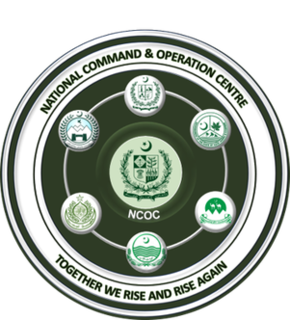 W
WThe National Command and Operation Center (NCOC) is the principal body governing the policies and implementation of the national COVID-19 effort of Pakistan. It was formed in April 2020 on the orders of the Prime Minister of Pakistan Imran Khan to collate, analyze, and process information received from all provinces, AJK, Gilgit-Baltistan, and the Capital Territory. It also makes recommendations to the National Coordination Committee (NCC), which is headed by the Prime Minister for timely interventions relating to the national COVID-19 response effort.
 W
WThe National Security Advisor (NSA) is the senior official on the National Security Council of Pakistan, and the chief adviser to the Prime Minister of Pakistan on national security and international affairs. Moeed Yusuf is the current NSA, appointed by Prime Minister Imran Khan on may 18 2021. and has the same rank as a Federal Cabinet Minister.
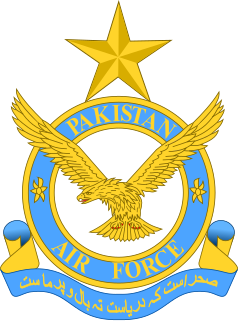 W
WThe Pakistan Air Force (PAF) is the aerial warfare branch of the Pakistan Armed Forces, tasked primarily with the aerial defence of Pakistan, with a secondary role of providing air support to the Pakistan Army and Navy when required, and a tertiary role of providing strategic airlift capability to Pakistan. As of 2021, as per the International Institute for Strategic Studies, the PAF has 70,000 active-duty personnel and operates at least 594 aircraft. Its primary mandate and mission is "to provide, in synergy with other inter-services, the most efficient, assured and cost effective aerial defence of Pakistan." Since its establishment in 1947, the PAF has been involved in various combat operations, providing aerial support to the operations and relief efforts of the Pakistani military. Under Article 243, the Constitution of Pakistan appoints the President of Pakistan as the civilian Commander-in-Chief of the Pakistan Armed Forces. The Chief of Air Staff (CAS), by statute a four-star commissioned air officer, is appointed by the President with the consultation and confirmation needed from the Prime Minister of Pakistan.
 W
WThe Pakistan Army is the land service branch of the Pakistan Armed Forces. The roots of its modern existence trace back to the British Indian Army that ceased to exist following the Partition of British India, which occurred as a result of the 1947 Indian Independence Act and established the Dominion of Pakistan on 14 August 1947 as a sovereign state independent from the United Kingdom. According to statistics provided by the International Institute for Strategic Studies (IISS) in 2020, the Pakistan Army has approximately 560,000 active-duty personnel, supported by the Army Reserve and National Guard. Pakistani citizens can enlist for voluntary military service upon reaching 16 years of age, but cannot be deployed for combat until the age of 18 in accordance with the constitution of Pakistan.
 W
WPakistan Secretariat serves as the headquarters for the Cabinet and Government of Pakistan. It is located on Red Zone in Islamabad, Capital Territory, Pakistan.
 W
WSikandar Sultan Raja is a Pakistani civil servant who serves as the Chief Election Commissioner of Pakistan, in office since January 2020. He belongs to the Pakistan Administrative Service and is batchmates with Rizwan Ahmed, Hussain Asghar, Fawad Hasan Fawad and Jawad Rafique Malik.
 W
WThe state emblem of Pakistan was adopted in 1954 and symbolizes Pakistan's ideological foundation, the basis of its economy, its cultural heritage and its guiding principles.
 W
WToshakhana is a government owned department under the control of Cabinet Division of Pakistan formed in 1974. Its main purpose is to keeps gifts which are received by Ministers MNA & foreign secretaries, president and Prime Minister as well.